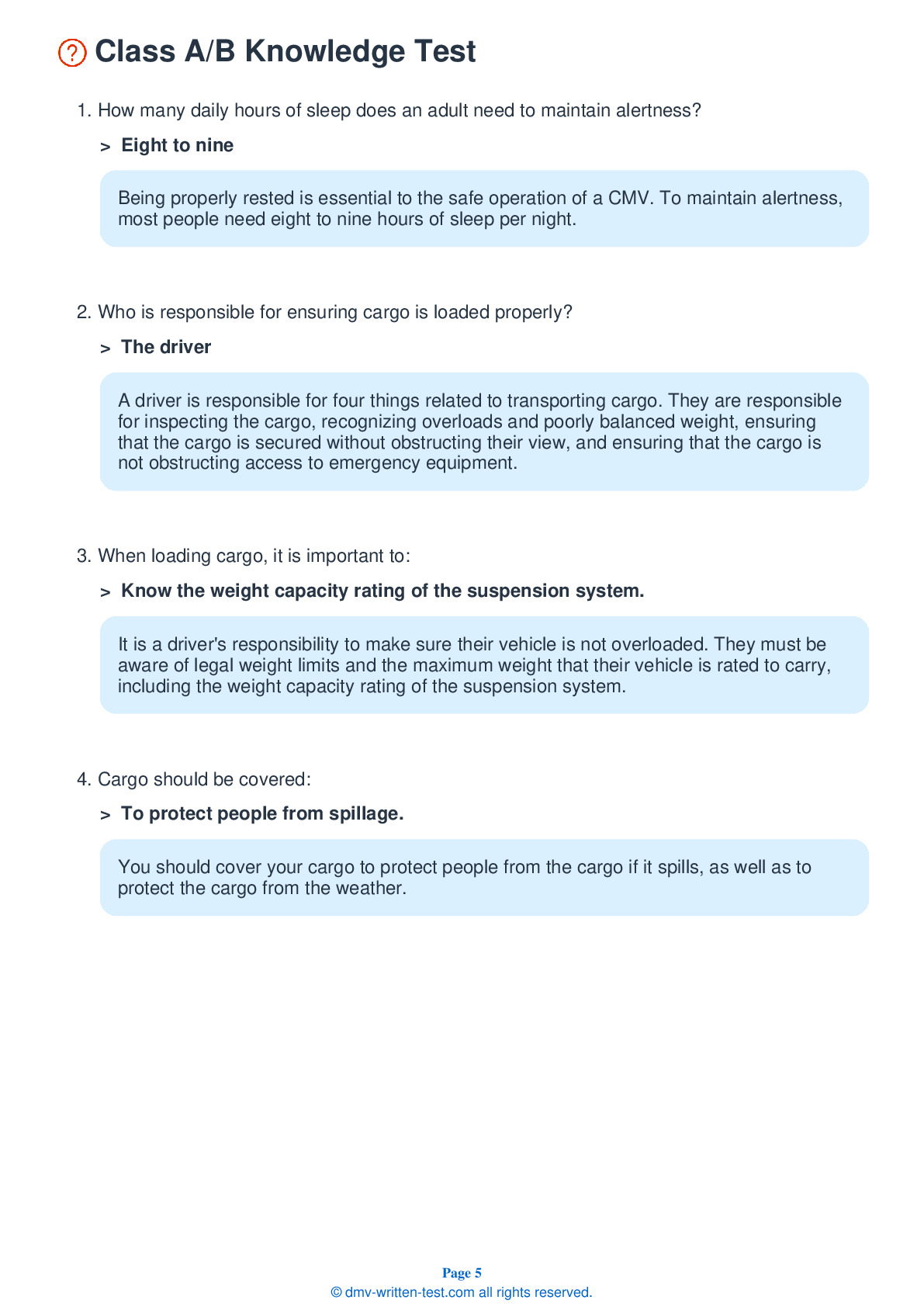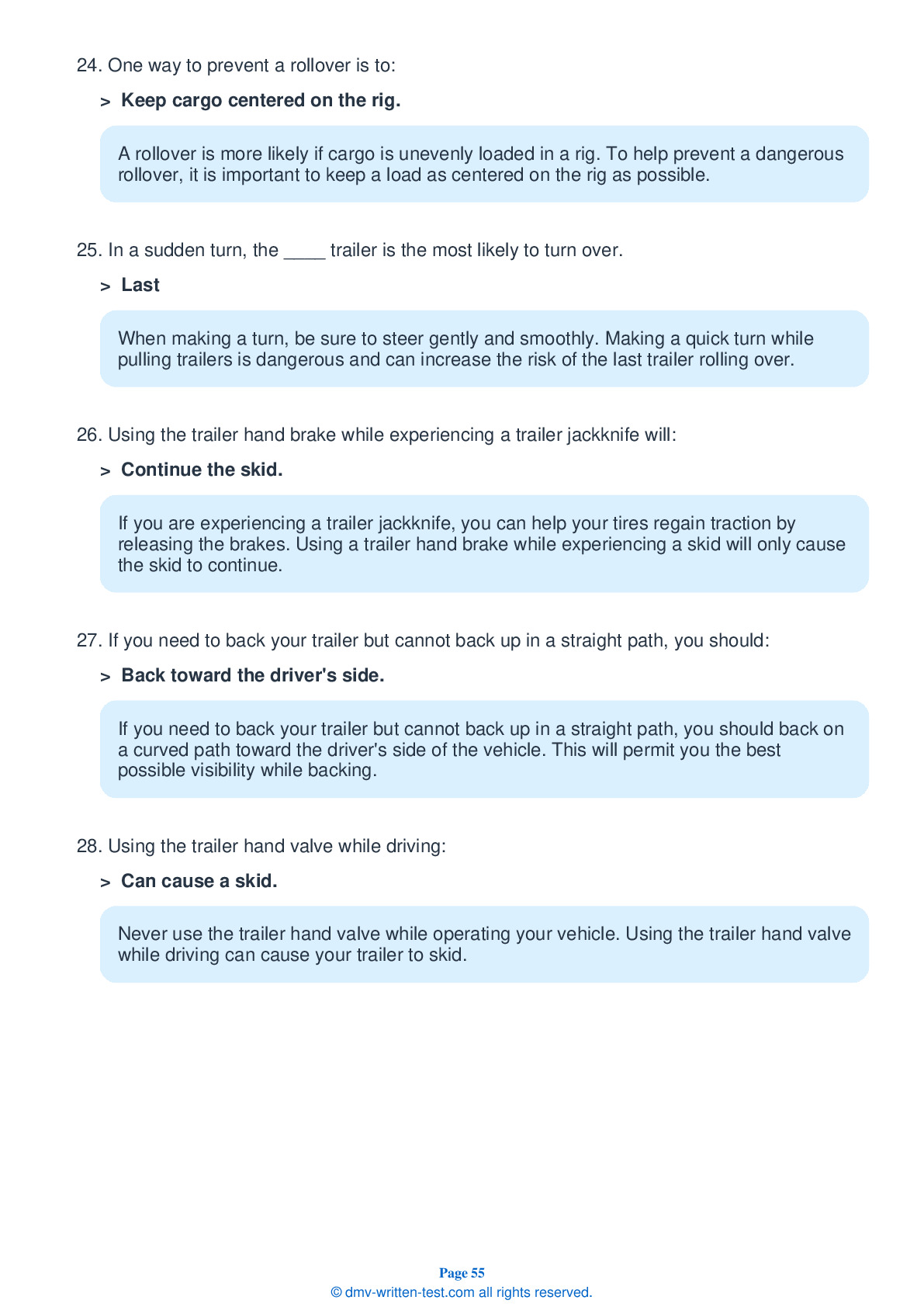Knowledge Test Class B
This license is required for driving a single vehicle with a GVWR of more than 26,001 pounds, and a trailer not to exceed 10,000 pounds gross vehicle weight rating, or a vehicle designed to transport 24 or more people (including the driver). To receive this license, applicants must pass a 50-question test. To pass, applicants must answer 40 questions correctly. Each question has four possible answer choices. Test questions come from the Washington D.C. Commercial Driver License Manual. Questions come from chapters covering: Introduction, Driving Safely, Transporting Cargo Safely, Air Brakes (if applicable), Pre-Trip Vehicle Inspection Test, Basic Vehicle Control Skills Test and On-Road Driving.. Endorsements that may be used with a Class B CDL are: Hazardous materials, Tank, Passenger, HazMat and Tank, Air Brakes and School bus.
1. When a tire goes flat, you may hear a loud bang. The truck will be affected:
There may be a delay of a few seconds between the sound of a tire failing and the time that the vehicle is affected by the tire failure. Because of the short delay, a driver may initially believe that the sound came from another vehicle.
2. If you are turning left and there are two available left turn lanes, which lane should you choose?
A large vehicle may need to swing right to make a left turn. If an intersection has two left turn lanes, the driver should choose the righthand land to begin their turn.
3. When changing lanes, you should:
Always change lanes slowly and smoothly. If there is a vehicle in the other lane that you did not see before beginning to move, they will have more time to react to your vehicle.
4. If confronted by an aggressive driver, you should:
If you encounter an aggressive driver, the most important thing to do is get out of their way, if possible. Do not provoke the driver by challenging them or making eye contact, and do not let yourself be provoked by rude gestures they might make.
5. A header board is used to:
Front-end header boards, also known as "headache racks," protect drivers from moving cargo in the event of a crash or emergency stop.
6. A cargo cover that flaps while you are driving:
If cargo is covered, the cover should not flap in the wind in transit. The cover could tear loose, uncovering the cargo while potentially blocking your view or the view of others.
7. During a vehicle inspection, ensure that the landing gear is:
When inspecting a trailer during a vehicle inspection test, ensure that its landing gear has no missing parts and that it is fully raised. The crank handle should be secure and the support frame should not be damaged.
Frequently Asked Questions
To obtain a Class B CDL in DC, follow these steps:
1. Obtain a Commercial Learner’s Permit (CLP) by passing the knowledge test for a Class B CDL.
2. Hold the CLP for at least 14 days before taking the skills test.
3. Schedule and pass the skills test at a DC DMV testing location. The skills test includes a pre-trip vehicle inspection, basic vehicle control, and on-road driving.
4. Provide proof of identity, residency, and Social Security number.
5. Pay the required fees.
It is important to note that additional endorsements may be required to operate certain types of vehicles or carry certain types of cargo. For example, a passenger endorsement is needed to operate a bus with passengers.
1. Large buses, such as school buses or city transit buses
2. Straight trucks with a Gross Vehicle Weight Rating (GVWR) of 26,001 pounds or more, including dump trucks and delivery trucks
3. Box trucks with trailers that have a combined GVWR of less than 26,001 pounds
4. Tow trucks that weigh less than 10,000 pounds
It is important to note that additional endorsements may be required to operate certain types of vehicles or carry certain types of cargo. For example, a passenger endorsement is needed to operate a bus with passengers. Also, if you want to tow a trailer with a GVWR greater than 10,000 pounds or carry hazardous materials, additional endorsements will be required.
1. Be at least 18 years of age (21 years of age to transport hazardous materials or operate a vehicle across state lines).
2. Have a valid non-commercial driver's license.
3. Provide proof of identity, residency, and Social Security number.
4. Pass a medical examination to confirm that you meet the physical requirements for a CDL license.
5. Obtain a Commercial Learner’s Permit (CLP) by passing the knowledge test for a Class B CDL.
6. Hold the CLP for at least 14 days before taking the skills test.
7. Successfully complete a skills test at a DC DMV testing location. The skills test includes a pre-trip vehicle inspection, basic vehicle control, and on-road driving.
8. Pay the required fees.
It is important to note that additional endorsements may be required to operate certain types of vehicles or carry certain types of cargo. For example, a passenger endorsement is needed to operate a bus with passengers. Also, if you want to tow a trailer with a GVWR greater than 10,000 pounds or carry hazardous materials, additional endorsements will be required.
If you want to operate a commercial vehicle outside of the District of Columbia or transport hazardous materials, you must be at least 21 years old.
1. Passenger endorsement (P) - required to operate a bus designed to transport 16 or more passengers, including the driver.
2. School bus endorsement (S) - required to operate a school bus.
3. Tanker endorsement (N) - required to operate a vehicle that transports liquids or gases in bulk containers with a capacity of 1,000 gallons or more.
4. Hazardous materials endorsement (H) - required to transport hazardous materials in amounts that require placards on the vehicle.
You will need to pass additional knowledge and skills tests for each endorsement you seek. It is important to note that there may be additional requirements for obtaining certain endorsements, such as a background check or specialized training.
1. Pre-trip inspection: You will be required to perform a thorough pre-trip inspection of your vehicle, identifying any potential safety hazards or mechanical issues.
2. Basic vehicle control: You will be required to demonstrate your ability to control the vehicle in various driving situations, such as backing up, turning, and parking.
3. On-road driving: You will be required to demonstrate your ability to safely operate the vehicle in traffic, following all traffic laws and regulations.
During the skills test, you will be evaluated on your ability to perform each task safely and effectively. To pass the test, you must not accumulate more than 30 points of error across all three parts of the test. It is important to note that specific requirements for the skills test may vary depending on your state or jurisdiction.
1. Vehicle weight: Drivers with a Class B CDL may only operate a vehicle with a gross vehicle weight rating (GVWR) of 26,001 pounds or more, or a combination of vehicles with a GCWR of 26,001 pounds or more.
2. Passenger restrictions: Drivers with a Class B CDL may only transport up to 16 passengers (including the driver) in a single vehicle.
3. Hazardous materials: Drivers with a Class B CDL may transport hazardous materials in amounts that require placards on the vehicle, but only if they have also obtained the required Hazardous Materials (H) endorsement.
4. Interstate vs. intrastate: Drivers with a Class B CDL may be restricted to operating only within their state (intrastate) or may be allowed to operate across state lines (interstate), depending on their individual license and endorsement qualifications.
It is important to note that specific restrictions and limitations may vary depending on your state or jurisdiction, as well as your individual license and endorsement qualifications.
If the written test is not available in your preferred language, you may still be able to take the test with the help of an interpreter. However, this may require additional arrangements and fees, and you will need to check with your local DMV or licensing agency about their specific rules and requirements for using an interpreter during the test.
It is important to note that even if you take the written test in a language other than English, you will still need to be able to read and understand English for other aspects of the CDL application process, such as the pre-trip inspection and on-road skills tests.
The specific accommodations that may be available will depend on your individual needs and the nature of your disability. Some possible accommodations could include extended testing time, a separate testing room, a sign language interpreter, or a reader to assist with reading and understanding the test questions.
To request accommodations, you will need to contact your local DMV or licensing agency and provide documentation of your disability and your specific accommodation needs. It is important to make this request as early as possible in the application process to allow time for any necessary arrangements to be made.
It is also worth noting that some states may have their own specific requirements and procedures for requesting accommodations, so be sure to check with your local DMV or licensing agency for their specific rules and guidelines.
In most cases, you will need to pay a fee each time you retake the test. It is important to use the time between tests to study and prepare for the exam, so that you can improve your chances of passing on your next attempt.
If you fail the test multiple times, you may be required to complete additional training or education before being allowed to retake the exam again. It is important to check with your local DMV or licensing agency to understand their specific rules and requirements for retaking the Class B CDL written test.




